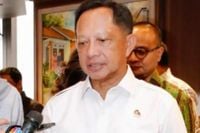JAKARTA, Waspada.co.id – The call for Solo to become its own province, named Daerah Istimewa Surakarta (DIS), has gained traction, but officials are skeptical about its necessity. Aria Bima, the Vice Chairman of the Indonesian House of Representatives' Commission II, stated on April 24, 2025, that he has yet to find a compelling connection to support the proposal for Solo's expansion into a separate province.
During a press conference at the Parliament Complex in Senayan, Jakarta, Bima, a member of the PDI Perjuangan party, acknowledged that there have been proposals submitted to the DPR RI regarding this idea. However, he expressed doubts about the relevance of granting Solo special status at this time. "I see whether the relevance for now is there?" he remarked, highlighting that Solo has already established itself as a trading, educational, and industrial city.
Despite the historical significance of Solo, which was once a royal territory and played a pivotal role in Indonesia's independence struggle, Bima conveyed his lack of enthusiasm for the idea of granting it special status. "Solo is already a trading city, an educational city, and an industrial city. There’s nothing more that needs to be privileged," he asserted, emphasizing that the Commission II is not particularly interested in discussing the proposal further.
On the matter of why this proposal is surfacing now, Bima noted that it stems from the historical values associated with the city. Yet, he insisted that any decision to classify a region as special must be based on thorough research to ensure fairness among other regions. "In principle, this unitary state means we are one territorial unit, one administrative unit, one economic unit, where there must be a sense of justice among regions. We must not allow the granting of special status to create feelings of injustice in other areas," he explained.
Meanwhile, Central Java Governor Ahmad Luthfi addressed the issue of provincial expansion on April 22, 2025. He stated that he has no objections to the proposal, provided it does not disrupt regional economic stability. "As long as it does not disturb economic stability, we are open to expansion. But everything must go through thorough studies," Luthfi expressed, reinforcing the need for careful consideration before moving forward.
Luthfi further clarified that the discussions around creating a new administrative area should be rooted in deep analysis and not merely driven by political or emotional motivations. He emphasized that the current discussions are still in the preliminary stages and have not yet progressed toward implementation. "This is still just a discussion, not heading towards realization yet," he stated.
The proposal to elevate Solo's status is not without precedent in Indonesia. Currently, only two provinces in the country hold special status: Daerah Istimewa Yogyakarta (DIY) and Aceh. According to Article 18B, paragraph (1) of the 1945 Constitution, the state recognizes and respects regions with special and unique governance, as regulated by law. DIY is governed by Law No. 13 of 2012, which stipulates that the positions of governor and deputy governor are filled by appointments from the Sultanate of Yogyakarta and the Pakualaman principality. In contrast, Aceh’s special status is derived from Law No. 11 of 2006, which mandates that its governance aligns with Islamic principles and utilizes Qanun as local regulations.
As discussions about Solo's potential as a special region continue, it remains to be seen whether the historical and cultural arguments will be enough to sway policymakers. The ongoing dialogue emphasizes the need for a balanced approach that considers both the aspirations of the local community and the broader implications for regional equity.
In conclusion, while the push for Solo to become Daerah Istimewa Surakarta reflects a desire to honor its rich history, the political and economic realities may complicate the realization of this ambition. Stakeholders will need to engage in thoughtful analysis to ensure that any changes serve the best interests of the region and its people.




